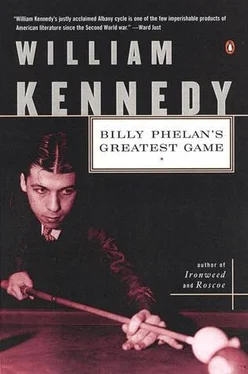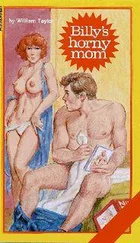“I saw him Thursday down in Spanish George’s,” Martin said, “and I told him to call me if he needed anything.”
“You didn’t tell me you saw him.”
“He didn’t want me to. When you see him, you’ll know why.”
“Why’d you call me now?”
“It’ll be in the paper tonight, or maybe even this afternoon, who he is and used to be. You had to know before that.”
They sat down on a long, wooden bench in the empty courtroom. A white-haired man in shirtsleeves came in from the room behind the judge’s bench and sniffed at them, then went out again.
“Did you ever know why he left home?” Billy asked.
“I know the gossip. He drank, then the baby died. The one fed the other.”
“I was nine.”
“Do you remember him well? You could at nine.”
“I don’t know if I remember his face from seeing it, or from the picture. There’s one home in a box of snapshots, about nineteen fifteen, the year before he left. He’s standing on our old stoop on Colonie Street.”
“He was all done with baseball then. I can remember how he looked. He doesn’t look like that anymore.”
With a magnifying glass, Billy had studied how his father wore his sweater, the same one he wore in the rowboat, and maybe the same cap. He studied the cut of his jaw, the shape of his eyes, and his smile, the lips open and twisted a little to the left. It was a good smile, a strong smile. But Billy’s mother said it was a weak thing to leave us and drink so much. A man shouldn’t be weak like that, she said. But, oh my, how he cried, she said. How we all cried.
“Here,” said Martin, nudging Billy Through an open door they saw men entering the hallway behind the courtroom. One guard in blue shirt and policeman’s cap walked ahead of the prisoner, and one behind him. Billy was not prepared for this sight. It was Pete the Tramp without a hat, without the spiky mustache, without the comedy. When tramps came to the house and asked for a meal, Billy’s mother always fed them, and gave them coffee with milk. Now he knew why. Billy and Martin followed the procession. The tramp dragged his feet, slouched, shuffled on fallen arches, or maybe on stumps with toes frozen and gone. Billy kept his father’s dirty gray hair in sight. He did not remember hair on his father, he remembered a cap.
The white-haired man who had sniffed at them turned from the large ledger in which he was writing. Billy remembered seeing the man only last month at Foley’s pit in Troy, handling fighting cocks for Patsy McCall. His name was Kelly and he was a hell of a handler.
“What’s this?” Kelly said, pen in hand.
“Bail. Francis Phelan,” said the first policeman.
“Ah, you’re the one,” Kelly said, putting down his pen and sticking out his right hand to Francis. “Congratulations. Twenty-one, was it?” And everyone laughed.
“So they say,” Francis said.
Billy saw his father’s smile and recognized the curve of the lips, but the teeth were brown in front, and there were no teeth at all behind them. The mouth was a dark cavity. The smile was dead.
“Somebody got bail money?” Kelly asked.
“Here,” said Billy, and he weaved his way through the men. He counted out four hundred dollars and Kelly took it to the next room and put it in a box in the open safe. Billy looked at his father and received a stare of indifference.
“You a bail bondsman? I don’t remember you,” Kelly said, his pen poised over the receipt book.
“No,” Billy said. “Family.”
Kelly handed Billy a receipt, and one of the policemen gave Francis a small white envelope with his belongings. Then both guards left the corridor. Billy, Martin, and Francis stood looking at one another until Martin said, “Let’s go,” and led the way out the door. He stopped at the top of the stairs.
“Martin, thanks for fixing it up,” Francis said.
“Not at all. I told you to call me.”
“You know a lawyer who’ll take me on?”
“I do. Marcus Gorman, the best in town. I already talked to him.”
Francis looked at Billy and nodded his head. “You’re Billy, ain’t you?”
“Yeah,” said Billy.
“Thanks for that dough.”
“My pleasure.”
Francis nodded again. “How you been?”
“Not bad,” Billy said. “How about yourself?”
“Well, I ain’t in jail.” And Francis cackled a throaty laugh, showing his brown teeth and the cavity of his mouth, and fell into a cough that twisted his whole body.
Billy offered him a Camel.
He took it.
They went down the stairs and out the front door onto Eagle Street, confronting a golden October afternoon, the bright sun warming the day with Indian summer’s final passion. Men were walking the street in shirtsleeves, and women’s dresses still had the look of August about them. The black mood that had fallen on Billy when he first saw his father faded into a new and more hopeful coloration under a sky so full of white, woolly clouds.
The bail almost wiped out Billy’s bankroll, but he still had sixty-two dollars and change. It was enough to get the old man a new outfit: shoes, suit, shirt, and tie. Make him look like an American citizen again.
When Martin told Billy about the bail, Billy had immediately said, I got it, I’ll go for it. I know it’s your money, Martin, but I’ll get more. I don’t want that money, Martin had said. Forget I ever won that bet. No, I don’t forget that, Billy said. What do you do when you lose? You pay.
“I gotta get something in my stomach,” Francis said. “I ain’t et in two days.”
“Didn’t they feed you out there in the can?” Billy asked.
“Nothin’d stay down. I still ain’t right.”
“We can go home. I’ll call Peg at the office and have her whip up a meal. She cooks good.”
“No,” Francis said. “No thanks, no. No.”
“Then what do you want?” asked Billy.
“Garlic soup,” Francis said. “You know an Italian place? They always got garlic.”
“Garlic soup?”
“Lombardo’s,” Martin said. “First-rate place.”
“I don’t want no meal,” said Francis. “Just garlic soup. Fixes up the stomach. A Mexican bum taught me that in Texas.”
“They’ll make whatever you want at Lombardo’s,” said Martin. “But listen, I’ve got appointments. I’ll leave you all to solve the garlic problem.”
“No, stick around,” Francis said.
“I’ve got work to do, Fran.”
“Nah, nah, nah,” said Francis and he grabbed Martin’s arm and started to walk with him. “Nah, nah. Stick around a while. It ain’t gonna kill you to be seen with an old bum.”
“Some of my best friends are bums,” said Martin. “The newspaper specializes in them.”
“So stick around, stick around.”
Billy followed the two men as they all walked down Eagle Street, his father’s slouch not so pronounced now, but his shuffle clearly the gimp’s gait, left leg dragging. Billy remembered somebody in the family saying Francis was lame, very lame, when he came back to Albany in thirty-five. Whatever it was, he’s still got a little of it.
They turned down Hudson Avenue and walked toward the Italian neighborhood, through the farmers’ market with its half a hundred trucks, and a scattering of horses and wagons. This had been the city produce market since the days before Francis was born, when everything here was horses and wagons. Billy was maybe six or seven when he gripped his father’s hand as they walked among the animals here, smelling the fresh and decaying produce, the fresh and decaying manure, a fluid stench Billy remembered now as clearly as he’d remembered the pine disinfectant. They walked past a spavined animal in its traces, chomping at the feed bag, mashing its leavings with its hind feet, and Billy looked at his father’s right hand, the back of it bulging with blue veins and scars Billy did not remember. Then he saw the first two joints were gone from the first finger. Billy pictured them curving around the hand-sewn and soap-rubbed seams of a baseball when his father was instructing him in the ways of an outcurve.
Читать дальше












